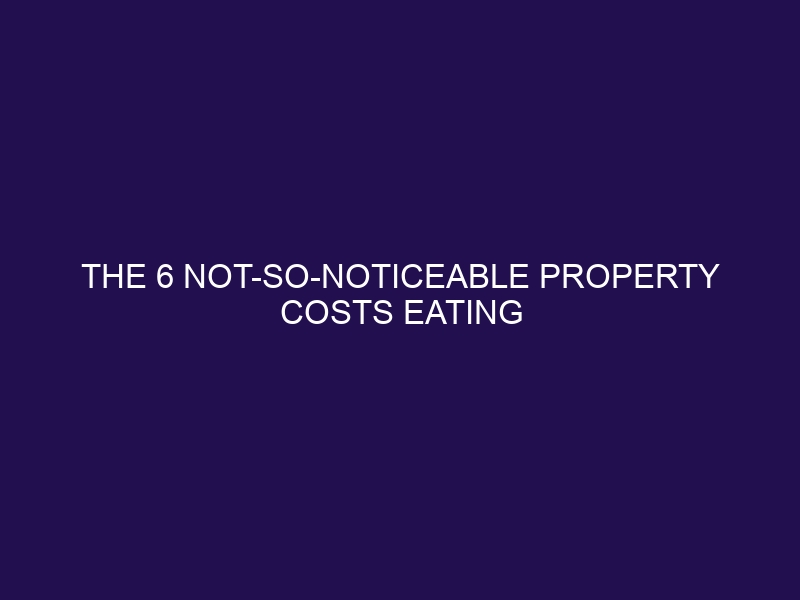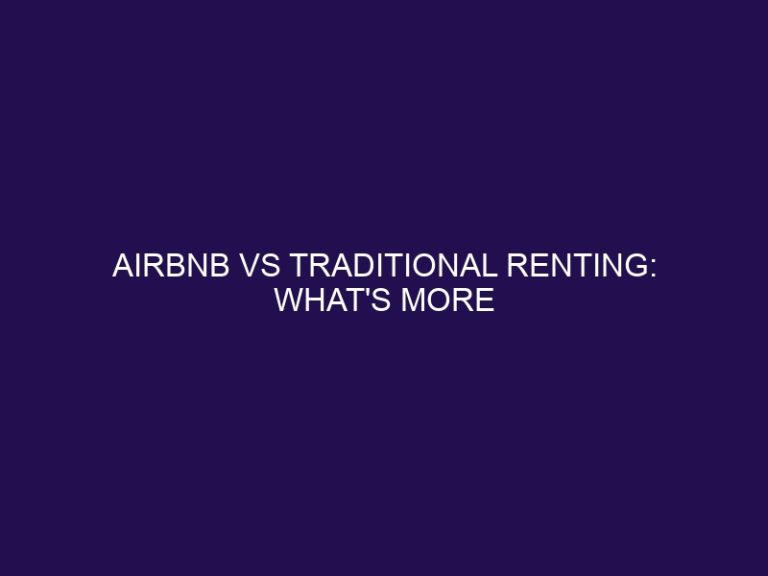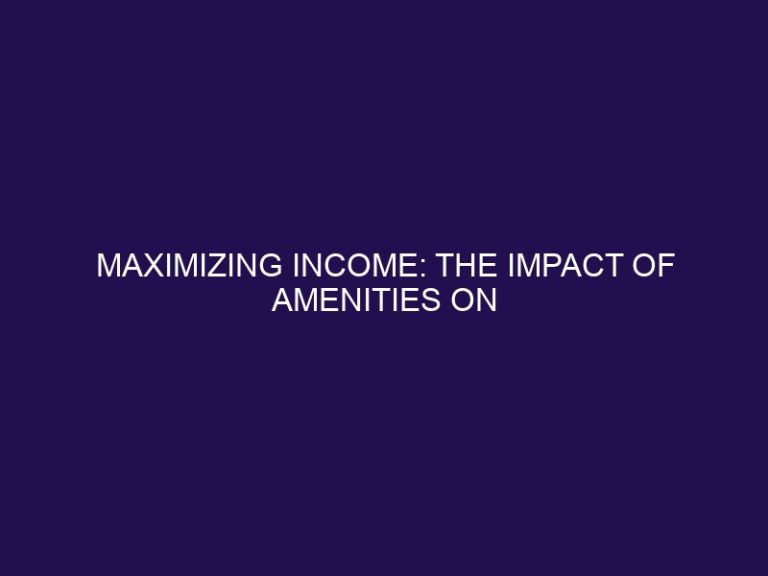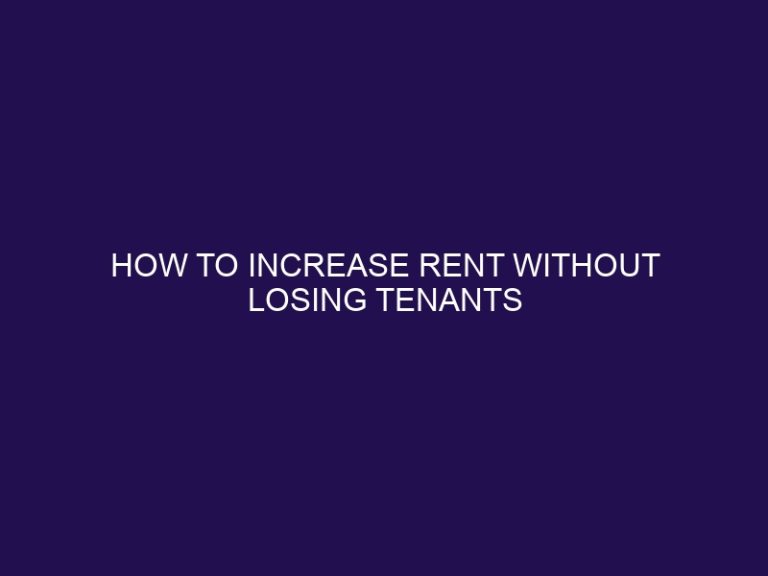The 6 Not-So-Noticeable Property Costs Eating Your Rental Profits
Owning a rental property can be a profitable investment, but many property owners are not aware of the hidden costs that eat into their rental profits. These overlooked expenses can significantly impact the financial success of your rental property and should be carefully considered when managing your property.
One renowned real estate investor, Robert Kiyosaki, highlights the importance of understanding all the costs associated with owning a rental property in his book, “Rich Dad Poor Dad.” In this article, we will explore the six hidden property costs that can affect your rental profits and how to minimize them.
What are the 6 Hidden Property Costs?
- Maintenance and Repairs: Regular maintenance and repairs are necessary to keep your property in good condition, but they can quickly add up and eat into your rental profits.
- Vacancy and Turnover: A high vacancy rate and frequent tenant turnover can significantly impact your rental income. Vacant units mean no rental income, and turnover costs such as cleaning, advertising, and repairs can add up.
- Utilities and Services: As a landlord, you are responsible for covering certain utilities and services for your tenants, such as water, electricity, and garbage removal. These expenses may seem small, but they can add up over time.
- Property Taxes and Insurance: Property taxes and insurance are essential costs that must be paid by property owners. However, they can fluctuate and increase over time, cutting into your rental profits.
- Property Management Fees: If you hire a property management company to handle your rental property, their fees will be an additional cost to consider.
- Capital Expenditures: Capital expenditures are significant expenses that occur occasionally, such as replacing appliances or renovating the property. These costs can significantly impact your rental profits if not budgeted for properly.
How to Reduce These Costs and Maximize Rental Profits?
- Regular Maintenance and Inspections: By conducting regular maintenance and inspections, you can catch any issues early on and address them before they become costly repairs. This can also help increase the lifespan of your property and reduce maintenance costs in the long run.
- Finding Reliable Tenants: Finding reliable and long-term tenants can greatly reduce vacancy and turnover costs. Conduct thorough tenant screenings, and establish clear rental agreements to ensure a stable and dependable tenant base.
- Implementing Energy-Efficient Measures: By implementing energy-efficient measures such as installing energy-saving light bulbs and low-flow fixtures, you can reduce utility costs and increase your rental profits.
- Shopping Around for Insurance and Property Management Services: It’s essential to shop around for the best insurance and property management services to ensure you are getting the most cost-effective options for your rental property.
- Budgeting for Capital Expenditures: Plan and budget for capital expenditures in advance. This will help you avoid unexpected costs and maintain a healthy cash flow for your rental property.
Conclusion: Owning a rental property can be a lucrative investment, but it’s crucial to consider all the hidden costs that can eat into your rental profits. By understanding these costs and taking proactive measures to reduce them, you can maximize your rental profits and achieve long-term success as a property owner.
Key Takeaways:
What are the 6 Hidden Property Costs?
As a rental property owner, it’s important to keep a close eye on your profits and expenses. While some costs may be obvious, such as mortgage payments and property taxes, there are also hidden costs that can eat into your profits if not carefully managed. In this section, we’ll uncover the 6 not-so-noticeable property costs that can significantly impact your rental income. From maintenance and repairs to property management fees, we’ll explore each cost and provide tips on how to minimize their impact on your rental profits.
1. Maintenance and Repairs
- Regular maintenance: Conduct routine inspections and promptly address any issues that arise.
- Preventive measures: Take proactive steps to prevent wear and tear and avoid the need for extensive repairs.
- Vendor management: Establish partnerships with reliable and cost-effective repair professionals to handle any necessary repairs.
Did you know? Consistent maintenance can lower repair costs by up to 20%.
2. Vacancy and Turnover
Vacancy and turnover can have a major impact on rental profits, resulting in marketing expenses, loss of rental income, and turnover maintenance. To mitigate these costs, it is important to implement proactive tenant retention strategies, efficient turnover processes, and swift rental property marketing.
3. Utilities and Services
- Choose energy-efficient appliances and lighting to lower utility costs.
- Negotiate service contracts for waste disposal, cleaning, and landscaping to effectively manage expenses.
- By implementing smart technology for efficient utility usage, significant savings can be achieved.
Did you know? Up to 30% of utility costs can be reduced through energy-efficient measures.
4. Property Taxes and Insurance
- Research local property tax rates and exemptions.
- Compare insurance policies to find the best coverage at competitive rates.
- Implement preventive measures to reduce insurance premiums.
- Consult with a tax professional to explore potential deductions.
- Regularly review and update insurance policies and tax assessments.
Maximize rental profits by strategically managing property taxes and insurance costs while ensuring adequate coverage.
5. Property Management Fees
- Gain a thorough understanding of the fees structure: Carefully review and comprehend the property management fees to avoid any hidden or unexpected charges.
- Comparison: Conduct thorough research and compare management fees from various companies to ensure competitive rates and favorable terms.
- Negotiation: Utilize negotiation skills to secure a mutually beneficial arrangement for both parties when it comes to property management fees.
6. Capital Expenditures
- Plan for major expenses such as HVAC replacements or roof repairs.
- Allocate funds regularly to a designated reserve for future large-scale maintenance.
- Consider energy-efficient upgrades to reduce long-term operational costs.
- Seek professional advice to ensure accurate budgeting for capital expenditures.
How to Reduce These Costs and Maximize Rental Profits?
Owning a rental property can be a lucrative source of income, but there are often hidden costs that can eat into your profits. In this section, we will discuss five key strategies for reducing these costs and maximizing your rental profits. From regular maintenance and inspections to finding reliable tenants, we will explore ways to minimize expenses and increase your rental income. By implementing energy-efficient measures, shopping around for insurance and property management services, and budgeting for capital expenditures, you can significantly improve your bottom line. Let’s dive in and discover how to maximize your rental profits.
1. Regular Maintenance and Inspections
- Schedule routine inspections to identify any maintenance needs.
- Conduct preventive maintenance to address any potential issues early on.
- Maintain detailed records of all maintenance and inspections.
- Ensure thorough inspections by training staff or hiring professionals.
2. Finding Reliable Tenants
- Thoroughly screen potential tenants, checking their rental history and references, to ensure reliability.
- Conduct background and credit checks to assess financial stability and rental behavior.
- Clearly communicate the lease terms and property rules to avoid misunderstandings.
- Consider utilizing professional property management services for tenant screening and lease management.
3. Implementing Energy-Efficient Measures
- Upgrade to LED lighting and energy-efficient appliances.
- Install programmable thermostats and smart energy monitoring systems.
- Implement insulation and weather-stripping for better energy retention.
- Opt for renewable energy sources like solar panels or wind turbines.
- Encourage tenant energy conservation through educational materials and incentives.
In response to the 1973 oil crisis, the implementation of energy-efficient measures became crucial, resulting in the widespread adoption of energy-saving technologies.
4. Shopping Around for Insurance and Property Management Services
- Compare insurance plans from various providers to find the best coverage and rates.
- Research different property management services to identify reputable and cost-effective options.
- Request quotes and thoroughly review service contracts to ensure comprehensive coverage and value.
Did you know? Shopping around can save property owners significant costs while securing quality insurance and management services.
5. Budgeting for Capital Expenditures
- Assess Property Needs: Evaluate the property’s condition and anticipate potential big-ticket items.
- Create a Reserve Fund: Set aside a portion of rental income for future large-scale repairs or replacements, including budgeting for capital expenditures.
- Regular Maintenance: Schedule routine upkeep to prevent costly issues.
A landlord diligently budgeted for capital expenditures, avoiding financial strain when unexpected maintenance was required, and maintaining tenant satisfaction.
Frequently Asked Questions
What are the 6 hidden costs of owning rental property?
The 6 hidden costs of owning rental property include unexpected costs, hot water, checking references, rental properties, bad tenants, and mortgage loan payments.
What is landlord insurance and why is it necessary?
Landlord insurance is necessary for rental property owners because it provides liability protection, coverage for covered loss, and even medical payments for tenants. It typically costs 25% more than regular homeowners’ insurance.
How can I ensure a steady cash flow from my rental property?
To ensure a steady cash flow from your rental property, it is important to budget for unexpected repairs, set aside money for vacancies, and regularly review and adjust your budget. Building relationships with reliable professionals and having a thorough screening process for tenants can also help minimize unexpected costs.
What are some common costs associated with rental properties?
Some common costs associated with rental properties include mortgage loan payments, insurance, property taxes, HOA fees, utilities, property management, licensing and inspections, marketing costs, emergency repairs, and tenant screening.
What are some important things to consider when buying rental property?
When buying rental property, it is important to consider the location and condition of the property, as well as the potential for unexpected expenses such as maintenance issues, vacancies, and legal fees. It is also important to have a contingency fund for unexpected costs and to regularly review and adjust the budget.
What are some tips for managing a successful rental property business?
To manage a successful rental property business, landlords should carefully plan and budget for all potential expenses, maintain good relationships with tenants, and stay up-to-date on real estate laws. It is also important to have a steady cash flow and to always have extra cash for surprise expenses. Building professional connections and having a good credit history can also be beneficial.







